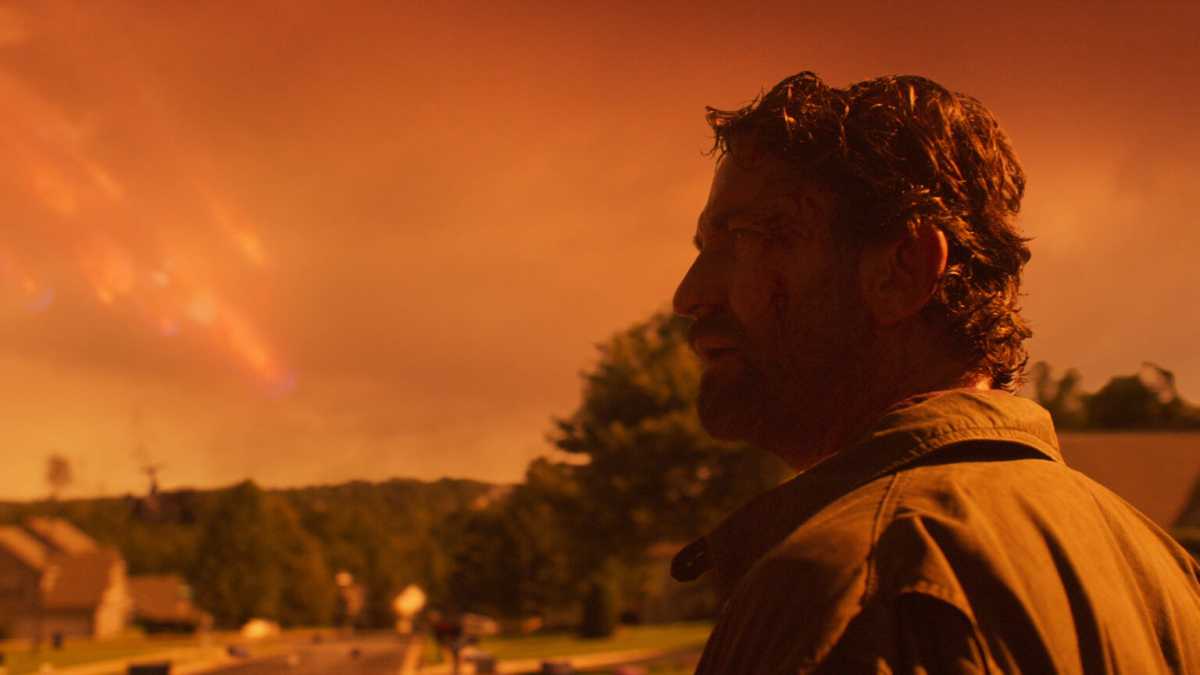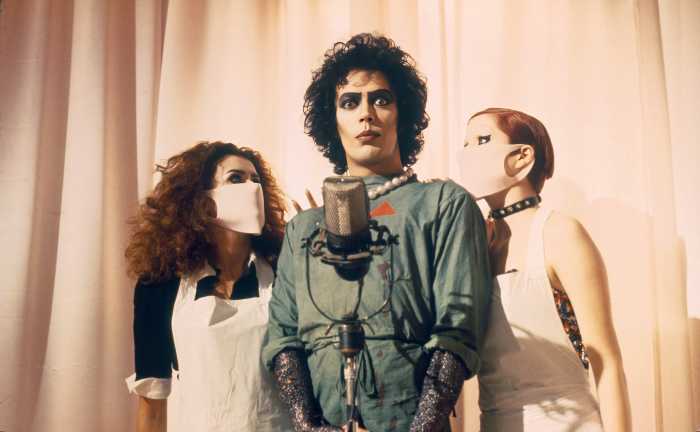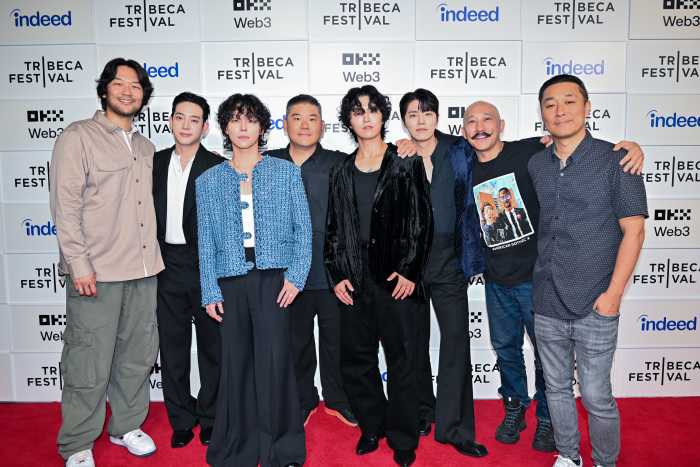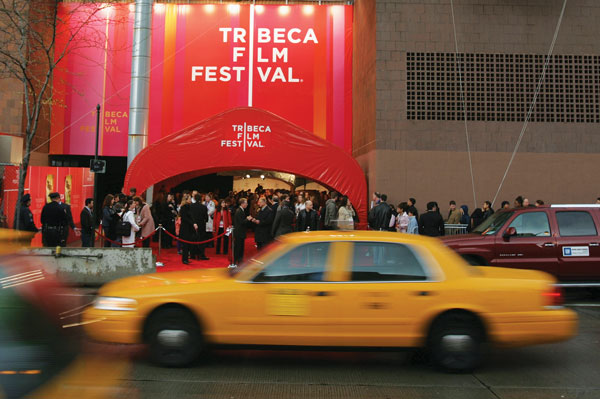BY MOLLY GIVEN
Action films normally have a lot of well, action, but what draws most people in to a story are the characters that make them up. Ric Roman Waugh’s new feature film “Greenland” explores both a crazy ride but also a more intimate portrayal of a family. Starring Gerard Butler and Morena Baccarin, “Greenland” follows one broken family who is trying to reconcile and come together once more before a deadly disaster in the form of a fatal comet coming towards Earth creates havoc.
The movie is 0 to 100 in both action and heart, and Ric Roman Waugh chatted with Metro to give more insight on why that combination is important to him.
What was it about the story that made you want to sign on and direct?
I’m always interested in the moral ambiguity of humanity and those questions of what we’re capable of. [Those questions] have been in my prison trilogy that I’ve done, and I was proud of the way that we, Gerry and I, were able to kind of put a stamp on “Angel Has Fallen” with somebody who is dealing with their own struggle and immortality and what we would do to preserve that. I was looking to do something in the disaster kind of horror space, but to find something that had a personal point of view to it too. So when I read “Greenland,” I knew I struck gold and I knew Gerry was the perfect teammate to go right on to it with where he could play a person that was relatable to us all.
There was no special skillset, just a man who was trying to find redemption in a failed marriage and trying to rekindle that and to atone for things. He thinks he has all the time in the world and then time is taken away and you get this big visceral action ride, but it’s told from an intimate point of view and from the inside out. That is what struck me, I get to have my cake and eat it too—I get to have this big action filled and visceral ride, but I get to play with those shades of morality and what people are capable of in life or death situations. Are they capable of doing heinous things for their own survival, or are they going to do right by each other? I love those types of questions, they’re relatable to who we are.
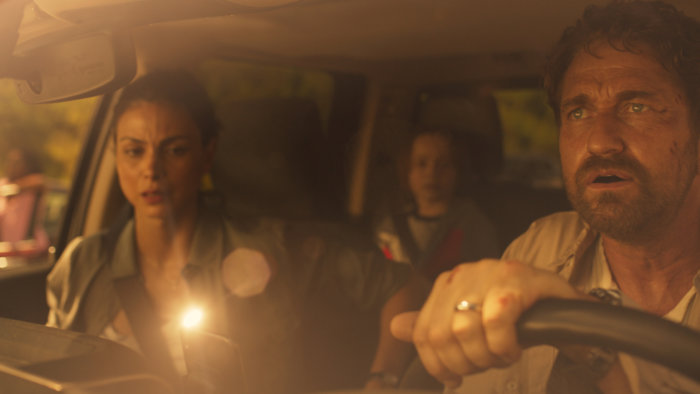
You knew you wanted Gerard Butler, but I wanted to know more about the casting specifically for Allison and Nathan since this film is so focused on their family as well?
That was really important to me. When I read the script, the first thing that jumped out at me is this wasn’t a man trying to win back a woman, it was a husband and wife trying to win back their marriage and to find their own feet again with each other. The fact that there’s a parallel journey in this film where you have two people that are trying to come together and think they have all the time in the world, and now time is taken away.
They get pulled apart on this journey and have equal footing of hardships to the point where they are both stripped down to their primal state. So, the casting of Allison was extremely important because she was always the co-lead of the movie and Gerry believed that as well that it should be a 50/50 sense. I’ve got to be honest with you, [I had] Morena Baccarin in the back of my head when I read the script because of what she brings to the table with her warmth and her truth that she brings in a lot of her roles. But also, she’s fierce and she’s always looking inward to find those types of character complexities.
So, I knew I had the husband and wife, and then, of course Nathan is a really important character. You cast the parents first and then you have the daunting task of finding a kid that is talented enough to pull off really complex emotional issues, but then also they have to look like the parents. We just hit gold with little Roger (Dale Floyd), you’re usually using an older kid to play someone young with these types of themes—Roger was 7 years old. That’s an extraordinary thing, he was playing some really complex things on screen and his worldy view at that age was just astounding to me.
It’s not just an action film like you said, it explores more on human nature itself. You also wanted to make this as scientifically real as possible—why were you drawn to that or what do you think that realness brings to the action genre?
I’m just not a fan of action for the sake of action. There’s a time and a place for that, and I think that there are movies that will go down that road and they should be made for the greater good of the spectacle, but for me, personally, I’m much more attached to action when the action is emotional and it’s engaged by a character’s point of view. The fact that this narrative engine was always told from the character’s perspective and we never wanted to break that, it reminded me of “The War of the Worlds” and how the worlds were unfolding around Tom Cruise and his son and his daughter and it reminded me of “Children of Men”—a really big, super high concept backdrop but told from a very intimate point of view. That was what struck me about “Greenland,” I was able to take you on this journey with the Garritys but do it in a way that made you feel like you were in a first person perspective with them, not only for the emotional ride of it, but the visceral ride of it and what it would be like.
You’ve worked also in stunts before going into writing and directing. Do you think your experience influences your directing style?
It does. I learned so much through my stunt career working for mentors like Tony Scott and a lot of the greats, and luckily I was a student of storytelling and watching how they made things and what they did. I think when you get that warchest of knowledge of how movies are put together, it informs you on how to tell a story in a way that you can technically pull it off at the same time. You’re flexing your dramatic muscles and trying to capture a real narrative thrust with character arcs that are cohesive with the bigger picture of the story, but then also have of the technical experience of how to achieve that in the first place.
My whole thing in the movies that I’ve done, like the Prison trilogy, I try to become my own aficionado. We have technical advisors and people to rely on, but I never wanted it to look for somebody and get the answer, I wanted to be able to know it myself so when I’m talking to an actor or crew-member, I’m talking from a place of action and truth versus trying to wing it and letting somebody else do the work for me.
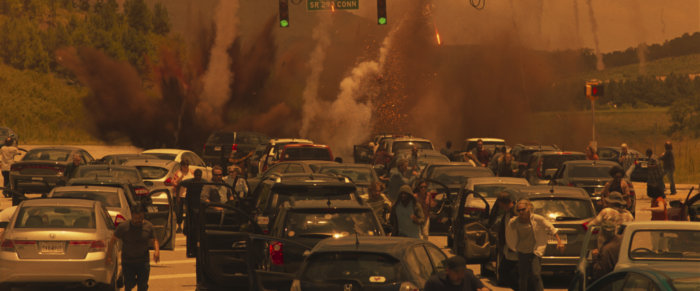
Overall, what do you hope audiences take away from the film?
The interesting thing about this movie is that it was made prior to COVID. We were in the middle of the mix when California shut down, and instead of everyone packing it in, I watched 300 people in all different parts of the world that were working on this movie, grab everything they could to work from home and finish this movie remotely, and it was a struggle.
But it reminded me about what this movie’s message was to me the entire time: when I read the script, living in this devisive world that we’re in today and living with all these hardships, I wish we would all focus on the hope and humanity that a lot of people have shown one another and that love is going to prevail. As cheesy and as cliche as that sounds, it was really the true message of this movie. You were going to go on this intense action ride with a lot of twists and turns and thriller moments and spectacle, but at the core it was about a family who very much so represents who we are today. [They realized] when it was life or death what really mattered, it’s each other.
All we want to do in life is to be loved and to love somebody back and I love that about this movie. Everybody will come away with an action ride, but hopefully, it’s a conversation about who we are today and we’re going to realize that we’re stronger together than apart.
“Greenland” will be released on PVOD Dec. 18.
This story first appeared on our sister publication philly.metro.us.



